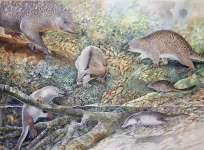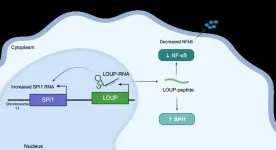(Press-News.org) Our willingness to help others is governed by a specific brain region pinpointed by researchers in a study of patients with brain damage to that region.
Learning about where in the brain ‘helping’ decisions are made is important for understanding how people might be motivated to tackle large global challenges, such as climate change, infectious disease and international conflict. It is also essential for finding new approaches to treating disorders of social interactions.
The study, published in Nature Human Behaviour, was carried out by researchers at the University of Birmingham and the University of Oxford, and shows for the first time how a region called the ventromedial prefrontal cortex (vmPFC) has a critical role in helping, or ‘prosocial’ behaviours.
Lead author Professor Patricia Lockwood said: “Prosocial behaviours are essential for addressing global challenges. Yet helping others is often effortful and humans are averse to effort. Understanding how effortful helping decisions are processed in the brain is extremely important.”
In the study, the researchers focused on the vmPFC, a region located right at the front of the brain, which is known to be important for decision-making and other executive functions. Previous studies using magnetic resonance imaging (MRI scanning) have linked the vmPFC to choices that involve a trade-off between the rewards available and the effort required to obtain rewards. However, these techniques cannot show whether a part of the brain is essential for these functions.
Three groups of participants were recruited for the study. 25 patients had vmPFC damage, 15 patients had damage elsewhere in the brain, and 40 people were healthy age and gender-matched control participants. These groups allowed the researchers to test the impact of damage to vmPFC specifically.
Each participant attended an experiment where they met another person anonymously. They then completed a decision-making task that measured how willing they were to exert physical effort (squeezing a grip force device) to earn rewards (bonus money) for themselves and for the other person.
By enabling participants to meet – but not see – the person they were ‘working’ for in advance, researchers were able to convey the sense that participants’ efforts would have real consequences, but hide any information about the other person that could affect decision-making.
Each choice the participants made varied in how much bonus money for them or the other person was available, and how much force they would have to exert to obtain the reward. This allowed the researchers to measure the impact of reward and effort separately, and to use advanced mathematical modelling to precisely quantify people’s motivation.
The results of the study clearly showed that the vmPFC was necessary for motivation to help others. Patients with vmPFC damage were less willing to choose to help others, exerted less force on even after they did decide to help, and earned less money to help others compared to the control groups.
In a further step, the researchers used a technique called lesion symptom mapping which enabled them to identify even more specific subregions of the vmPFC where damage made people particularly antisocial and unwilling to exert effort for the other person. Surprisingly, damage to a nearby but different subregion made people relatively more willing to help.
Co-lead author Dr Jo Cutler said: “As well as better understanding prosocial motivation, this study could also help us to develop new treatments for clinical disorders such as psychopathy, where understanding the underlying neural mechanisms can give us new insights into how to treat these conditions.”
“This region of the brain is particularly interesting because we know that it undergoes late development in teenagers, and also changes as we get older,” added Professor Lockwood. “It will be really interesting to see whether this area of the brain can also be influenced by education – can we learn to be better at helping others?”
END
Brain damage reveals part of the brain necessary for helping others
2024-05-27
ELSE PRESS RELEASES FROM THIS DATE:
Surprising properties of elastic turbulence discovered
2024-05-27
Blood, lymph fluid and other biological liquids can have surprising and sometimes troubling properties. Many of these biological solutions are non-Newtonian fluids, a type of liquid that is characterized by a non-linear relationship between stress and strain. Consequently, non-Newtonian fluids don’t necessarily behave as one would expect from a liquid. For example, some of these peculiar fluids deform when touched lightly but will act almost as a solid when a strong force is applied.
And biological ...
Study assesses cancer-related care at US hospitals predominantly serving minority populations compared with non-minority serving hospitals
2024-05-27
It’s important to ensure that care provided at US hospitals that predominantly serve Black and Hispanic populations is as high-quality as the care provided at other US hospitals. New research reveals significant disparities in the delivery of cancer-related care at minority serving hospitals (MSHs) compared with non-MSHs, however. The findings are published by Wiley online in CANCER, a peer-reviewed journal of the American Cancer Society.
For the study, investigators analyzed information from the National Cancer Database (which accrues approximately 70% of US cancer diagnoses) to identify patients eligible for definitive ...
First in-human investigator-initiated clinical trial to launch for refractory prostate cancer patients: Novel alpha therapy targets prostate-specific membrane antigen
2024-05-27
Osaka, Japan - A research team at Osaka University will start an investigator-initiated clinical trial for refractory prostate cancer patients after successful development of a new alpha-ray therapeutic agent ([At-211] PSMA-5) and confirmation of its efficacy in animal models. This will be a world-first in-human clinical trial with [At-211] PSMA-5.
Prostate cancer is on the rise worldwide and is the most commonly diagnosed new cancer in men in Japan. Various treatments are offered for prostate cancer, but the prognosis is very poor when the disease is resistant to standard treatment and associated with multiple metastases.
In ...
Will generative AI change the way universities communicate?
2024-05-27
Since the launch of ChatGPT 3 in November 2022, we've been abuzz with talk of artificial intelligence: is it an unprecedented opportunity, or will it rob everyone of jobs and creativity? As we debate on social media (and perhaps use ChatGPT almost daily), generative AIs have also entered the arena of university communication. These tools—based on “Large Language Models” that were optimized for interactive communication—can indeed support, expand, and innovate university communication ...
Artificial Intelligence could help cure loneliness, says expert
2024-05-27
Artificial Intelligence (AI) technology could offer companionship to lonely people amid an international epidemic of loneliness, says a robotics expert.
Tony Prescott, a professor of cognitive robotics at the University of Sheffield, argues in his new book The Psychology of Artificial Intelligence that ‘relationships with AIs could support people’ with forms of social interaction..
Loneliness has been found to seriously impair human health, and Professor Prescott makes a case that advances in AI technology could ...
Echidnapus identified from an ‘Age of Monotremes’
2024-05-26
Published today in the Alcheringa: An Australasian Journal of Palaeontology, evidence of an ‘Age of Monotremes’ has been unearthed by a team of Australian scientists at the Australian Museum (AM), Museums Victoria and Australian Opal Centre.
The findings were led by two renowned mammalogists, Honorary Associate of the Australian Museum, Professor Tim Flannery; and Professor Kris Helgen, Chief Scientist and Director of the Australian Museum Research Institute (AMRI).
Found in the Lightning Ridge opal fields, NSW, the opalised jaws ...
Semaglutide may protect kidney function in individuals with overweight or obesity and cardiovascular disease
2024-05-25
The SELECT Trial has revealed the potential of semaglutide, a glucagon-like peptide-1 (GLP-1) receptor agonist, in combating kidney function decline among individuals with overweight or obesity and established cardiovascular disease but without diabetes.1
Unveiling the results today at the 61st ERA Congress, researchers presented the impressive secondary analysis from the SELECT (Semaglutide Effects on Heart Disease and Stroke in Patients with Overweight or Obesity) trial, a randomised trial comprising a participant pool of 17,604 individuals.
Experts believe the study’s results offer hope for those affected by obesity, a condition known ...
New technique detects novel biomarkers for kidney diseases with nephrotic syndrome
2024-05-25
A groundbreaking study, presented today at the 61st ERA Congress, has uncovered a significant breakthrough in the diagnosis and monitoring of kidney diseases associated with nephrotic syndrome.1
Using a hybrid technique, researchers identified anti-nephrin autoantibodies as a reliable biomarker for tracking disease progression, opening new avenues for personalised treatment approaches.
Nephrotic syndrome, characterised by elevated protein levels in the urine, is linked to kidney diseases such as minimal change disease (MCD), primary focal segmental glomerulosclerosis (FSGS), and membranous nephropathy (MN). The primary cause behind nephrotic syndrome is damage to podocytes, the ...
Political elites take advantage of anti-partisan protests to disrupt politics
2024-05-24
Protest movements that reject political parties have an unintended consequence, according to new research from the University of Notre Dame: They empower savvy politicians who channel them to shake up the status quo.
The findings provide a framework for understanding recent global political realignments and offer lessons for activists who want to make a meaningful impact. They are particularly relevant in an era when mass protests have become an increasingly common tool to voice dissent with powerful institutions and draw attention to overlooked issues ranging from climate and conflict ...
Tiny target discovered on RNA to short-circuit inflammation, UC Santa Cruz researchers find
2024-05-24
UC Santa Cruz researchers have discovered a peptide in human RNA that regulates inflammation and may provide a new path for treating diseases such as arthritis and lupus. The team used a screening process based on the powerful gene-editing tool CRISPR to shed light on one of the biggest mysteries about our RNA–the molecule responsible for carrying out genetic information contained in our DNA.
This peptide originates from within a long non-coding RNA (lncRNA) called LOUP. According to the researchers, ...




